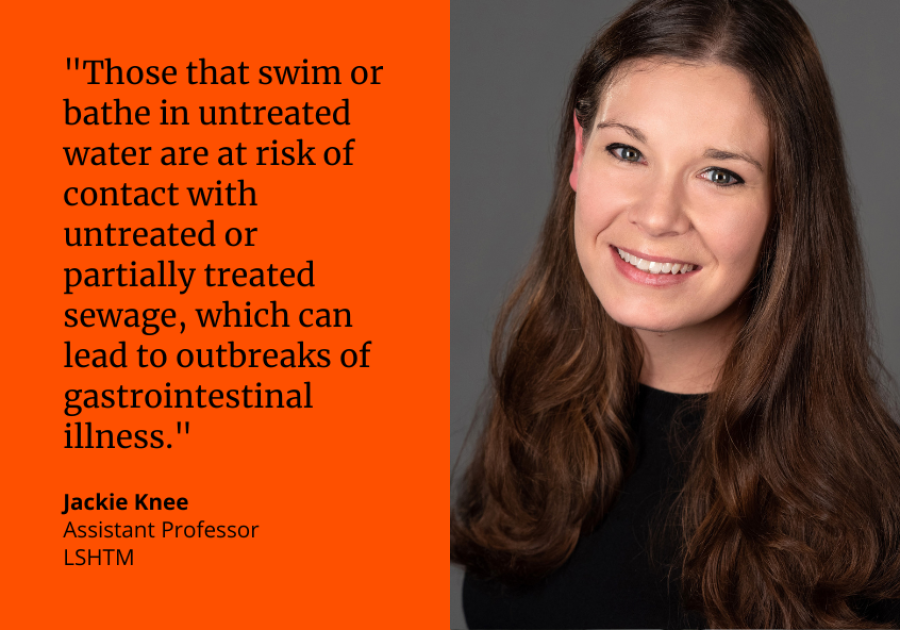Expert Comment – Why open water swimming could leave you unwell
14 August 2024 London School of Hygiene & Tropical Medicine London School of Hygiene & Tropical Medicine https://lshtm.ac.uk/themes/custom/lshtm/images/lshtm-logo-black.png
"Those that swim or bathe in untreated water are at risk of contact with untreated or partially treated sewage, which can lead to outbreaks of gastrointestinal illness." Jackie Knee, Assistant Professor, LSHTM
Professional swimmers who compete in open water events, such as at the Paris 2024 Olympics, and those who swim for leisure in rivers, lakes and the sea, may be at risk of experiencing health issues.
While symptoms will generally be mild to moderate and resolve on their own, microorganisms found in open water can cause gastrointestinal illnesses or stomach bugs, as well as respiratory, skin, ear and eye infections. There is also a risk of more severe infections caused by organisms including drug-resistant strains of E. coli or other pathogens, which can be harder to treat.
During the Paris Olympics, water quality in the River Seine was a recurring issue as officials contended with heavy rainfall and had to closely monitor safety for triathlon competitors. An outbreak of Cryptosporidium also recently occurred in the UK, believed to have been caused by water system failures.
According to the UK Health and Security Agency (UKHSA), swimmers can take practical measures to reduce the risk of illness, including minimising how much water they swallow, showering soon after swimming and washing hands before eating.
Dr Jackie Knee, Assistant Professor of Environmental Health and Microbiology in the Department of Disease Control at the London School of Hygiene & Tropical Medicine (LSHTM), said:
“It’s important to understand that open water swimming or sports in rivers, lakes and the sea, particularly those subject to sewer overflows and pollution by untreated or partially-treated human or animal waste, carries additional health risks compared with using swimming pools that are properly treated and managed.
“Those that swim or bathe in untreated water are at risk of contact with untreated or partially treated sewage, which can lead to outbreaks of gastrointestinal illness. A large-scale example of this is the gastrointestinal illness experienced by hundreds of open-water swimmers at an event in the River Thames in October 2012.
“Contact with water contaminated with waste poses a risk as it can contain a range of enteric pathogens that can cause mild to severe illness. These include viruses such as norovirus, bacteria such as Salmonella and pathogenic strains of E. coli, and parasites such as Cryptosporidium.
“Some of these pathogens can also be resistant to common treatments including antibiotics, making infections harder to treat. While ingestion is of primary concern, some illnesses can even occur through skin or eye contact, or inhalation.
“A common method used to monitor the quality of environmental and drinking water is to test for the presence of ‘faecal indicator bacteria’ like generic E. coli, a very common bacteria found in the gut of humans and mammals that typically causes little to no harm. Higher than normal levels of E. coli detected in natural waters, like rivers, may indicate a pollution event has occurred.
“To better understand the risks associated with open water swimming, sports or bathing, it would be necessary to measure levels of not only faecal indicator bacteria, like generic E. coli, but also the additional pathogens known to cause harm.
“Ultimately, what prevents illness from contaminated water is more effective monitoring, enforcement of safe swimming areas and investment in effective waste management and infrastructure, so that these overflows and contamination events occur far less frequently.”
LSHTM's short courses provide opportunities to study specialised topics across a broad range of public and global health fields. From AMR to vaccines, travel medicine to clinical trials, and modelling to malaria, refresh your skills and join one of our short courses today.